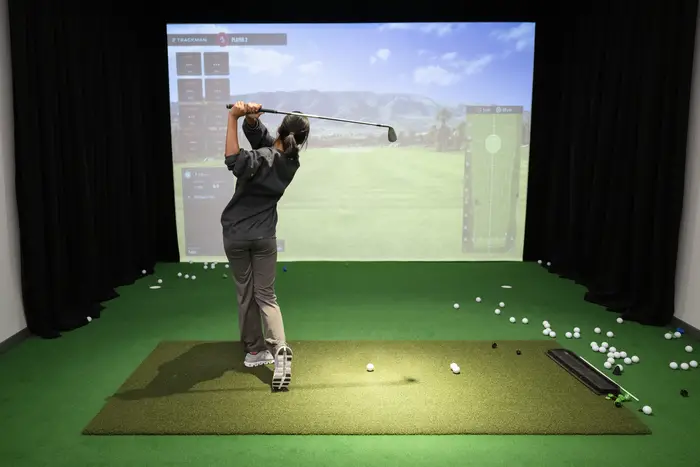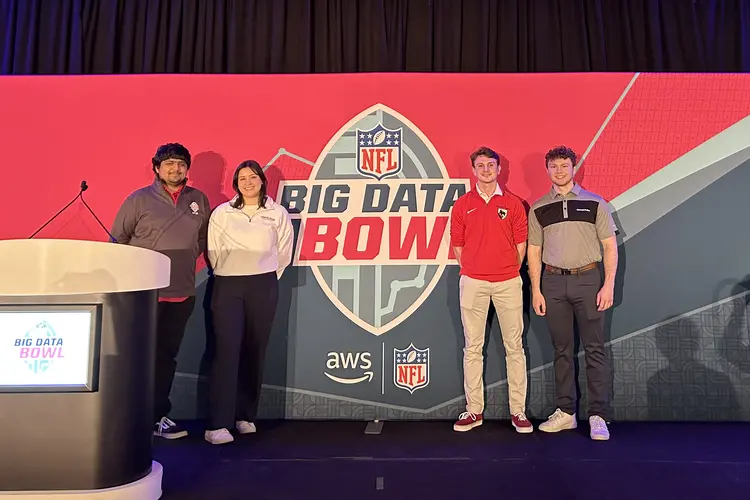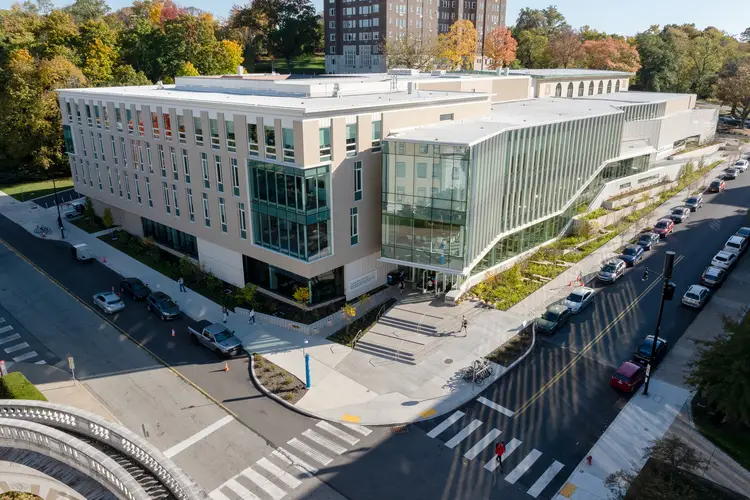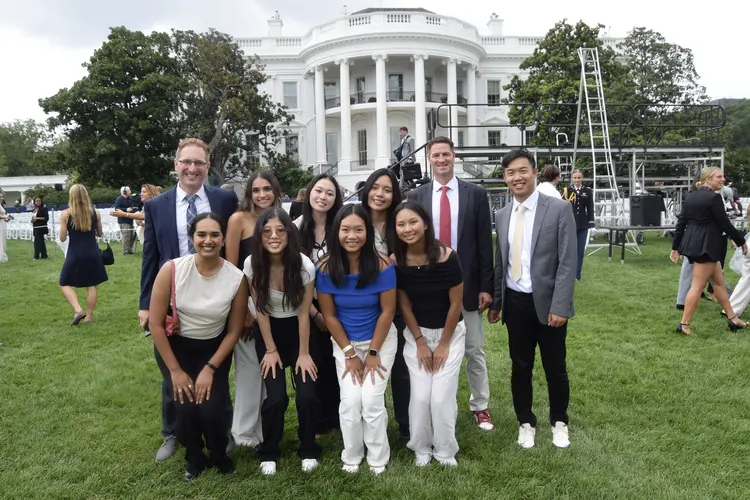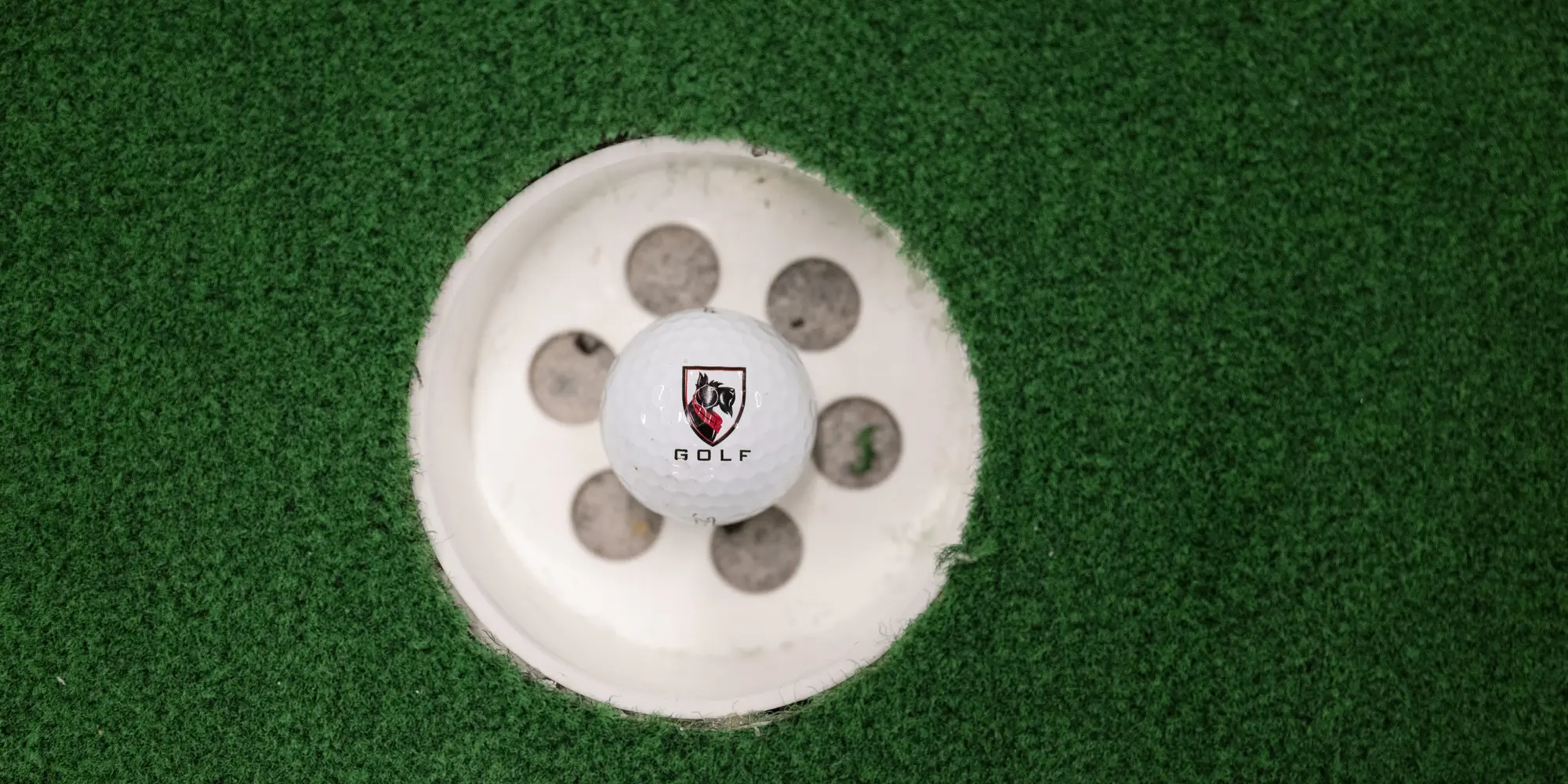
Carnegie Mellon Launches Sports Analytics Center
Media Inquiries
Using data from Carnegie Mellon University’s champion men(opens in new window)’s and women(opens in new window)’s teams, three undergraduate Statistics & Data Science(opens in new window) students analyzed 11,924 golf shots aiming to improve player performance.
Faculty adviser Ron Yurko(opens in new window), guided students Jackson Meehan, Emily Feng and Rohan Patel on a project examining the golf teams’ Trackman Golf Simulator data(opens in new window).
Yurko has been central to research efforts, like the golf project, and initiatives around sports analytics at CMU, which announced the launch of the Carnegie Mellon Sports Analytics Center(opens in new window) (CMSAC) at its annual conference on Nov. 1-2.
“By coming to Carnegie Mellon, students know they are at an entry point to launch a career in sports analytics. We provide the resources, the right education, and the skill sets that teams and industry partners are looking for,” said Yurko, an assistant teaching professor in the Dietrich College of Humanities and Social Sciences(opens in new window) who will serve as the CMSAC’s director. “We’re taking sports analytics education to a much higher level. This center is really a hub for our research efforts, educational initiatives and industry engagement.”
Changing the game: The post-Moneyball era
As a home for long-standing initiatives in sports analytics at the university — such as participation in the NFL’s Big Data Bowl — CMSAC will create innovative experiences for students who are pursuing careers as data scientists in the world of professional athletics.
CMSAC will benefit from the experience of CMU faculty Rebecca Nugent(opens in new window), the Fienberg Professor of Statistics & Data Science and department head; Peter Freeman(opens in new window), an associate teaching professor; and Sam Ventura(opens in new window), an affiliated faculty member and CMU alumnus who works as the vice president of hockey strategy and research for the Buffalo Sabres of the NHL.
“Carnegie Mellon has a long tradition of supporting cutting-edge research in sports analytics that really focuses on ‘changing the game’ — pun intended! We emphasize using the latest advances in statistics, data science, computer science and social sciences to tackle modern problems using the fine-grained, but complex datasets, e.g. tracking data, that are more commonly collected today,” Nugent said.
The roots of CMU’s sports analytics efforts date back to early research conducted by faculty and Ph.D. students. Over time, these initiatives have led to the establishment of an active research lab(opens in new window) and various educational programs like the Carnegie Mellon Sports Analytics Camp(opens in new window) (applications open in January 2025).
“When CMSAC first started, it was more like a small group of people working on a set of impactful research and education projects, all aligned on their vision to push open source, reproducible research and building broad student pipelines to internship and employment opportunities as well as graduate school,” Nugent said. “CMSAC was able to build from a few research projects and a small workshop to its current slate of sold-out conferences, NSF-supported research, summer undergraduate research programs, and a fast-growing alumni network.”
In fact, three of the four teams in last year’s NFL conference championships had Carnegie Mellon alumni on staff.
CMSAC will utilize partnerships with professional teams, leagues and companies to drive innovation in sports analytics and create pathways toward sports analytics careers for CMU graduates.
Data for the win
Years ago — when CMSAC was just an idea — Dan Rodgers(opens in new window) had data and no one to decode it for him.
The head coach for Carnegie Mellon’s men’s and women’s golf teams, Rodgers knew that the information being collected by the teams’ golf simulators contained valuable insights. In search of partners aligned toward golf-team success, Rodgers connected with Nugent, and for six years different teams of students have dug into the Trackman data.
“We highly value interdisciplinary work and solving real-world challenges,” Nugent said. “Our network of alumni and partners has been fantastic at bringing us great projects and working together to train students to become top-notch statisticians and data scientists.”
The project took second place(opens in new window) in the statistics competition of CMU’s 2023 Meeting of the Minds(opens in new window), an annual undergraduate research symposium, by answering questions like: Why is one club substantially better than another, for a certain player?
Using the analysis, Rodgers was able to target individuals’ weaknesses more effectively. In May 2023, the men’s team won Carnegie Mellon’s first-ever NCAA Division III Championship. The following year, the women’s team followed suit, and won their first championship the following year.
“The information and analysis these students have provided has been very valuable to what it is we’ve been trying to accomplish these last couple of years,” Rodgers said. “We try to figure out how we can use this insight to better coach each of our individual student-athletes.”
